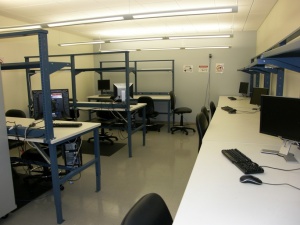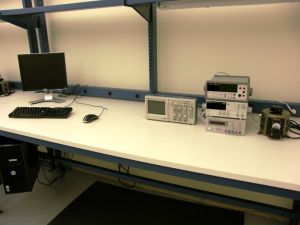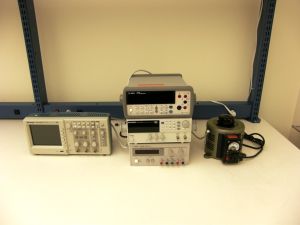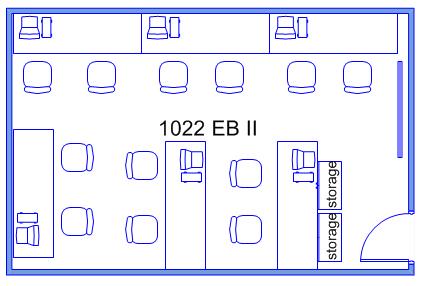Difference between revisions of "Teaching Labs/1022 EB2"
| Line 3: | Line 3: | ||
The '''Power Electronics Lab''' provides six stations for students to work in teams, each consisting of a large high-quality workbench with overhead storage and a dedicated computer workstation. Each station provides an oscilloscope, multimeter, power supply, and function generator, and two storage cabinets provide space to store equipment and materials for projects and classes. The lab also contains additional equipment that is currently found only in the Power Electronics lab, such as variable autotransformers and dynamometer kits. | The '''Power Electronics Lab''' provides six stations for students to work in teams, each consisting of a large high-quality workbench with overhead storage and a dedicated computer workstation. Each station provides an oscilloscope, multimeter, power supply, and function generator, and two storage cabinets provide space to store equipment and materials for projects and classes. The lab also contains additional equipment that is currently found only in the Power Electronics lab, such as variable autotransformers and dynamometer kits. | ||
| − | Classes in the Power Electronics lab deal with the principles and devices necessary for providing power to machinery and electronics found in our modern world. Topics range from basic direct-current and alternating-current machinery to components of a power system, including circuit breakers and fuses. More advanced courses discuss semiconductor and solid-state devices | + | Classes in the Power Electronics lab deal with the principles and devices necessary for providing power to machinery and electronics found in our modern world. Topics range from basic direct-current and alternating-current machinery to components of a power system, including circuit breakers and fuses. More advanced courses discuss semiconductor and solid-state devices as well as the development of renewable energy systems. Students will utilize equipment and software to perform calculations and simulations of device performance and system power flow. |
---- | ---- | ||
====Lab Schedule==== | ====Lab Schedule==== | ||
Revision as of 17:05, 17 March 2009
Power Electronics Lab
The Power Electronics Lab provides six stations for students to work in teams, each consisting of a large high-quality workbench with overhead storage and a dedicated computer workstation. Each station provides an oscilloscope, multimeter, power supply, and function generator, and two storage cabinets provide space to store equipment and materials for projects and classes. The lab also contains additional equipment that is currently found only in the Power Electronics lab, such as variable autotransformers and dynamometer kits.
Classes in the Power Electronics lab deal with the principles and devices necessary for providing power to machinery and electronics found in our modern world. Topics range from basic direct-current and alternating-current machinery to components of a power system, including circuit breakers and fuses. More advanced courses discuss semiconductor and solid-state devices as well as the development of renewable energy systems. Students will utilize equipment and software to perform calculations and simulations of device performance and system power flow.
Lab Schedule
To schedule this lab, email ecehelp@ncsu.edu.
Related Research Areas
Course Information
Equipment
| Number of Computers: | 6 |
| Operating System: | Microsoft Windows XP Professional |
| Model: | Dell Optiplex 320 |
| Processor: | Pentium D 3.0 GHz |
| RAM: | 2048 MB |
| Software: | Maple Matlab Microsoft Office Microsoft Project Microsoft Visio SAS JMP Sun JDK TecPlot Visual Slickedit Wolfcall/AFS/Kerberos |
| Instruments: | 6 GW Instek SFG-2004 100Mhz DDS Function Generators 6 Tenma 72-110 10A Variable Autotransformers 6 Agilent E3620A 50W Dual Output Power Supplies 6 Agilent 34405A Digital Multimeters 6 Techtronix TDS-1001B 40 MHz Digital Oscilloscopes |



